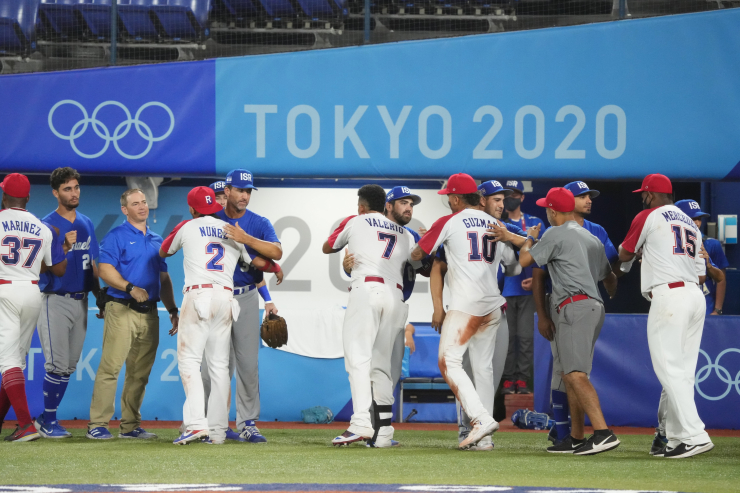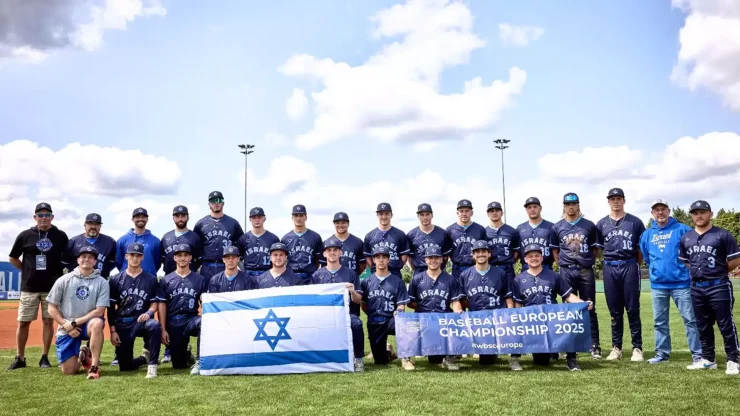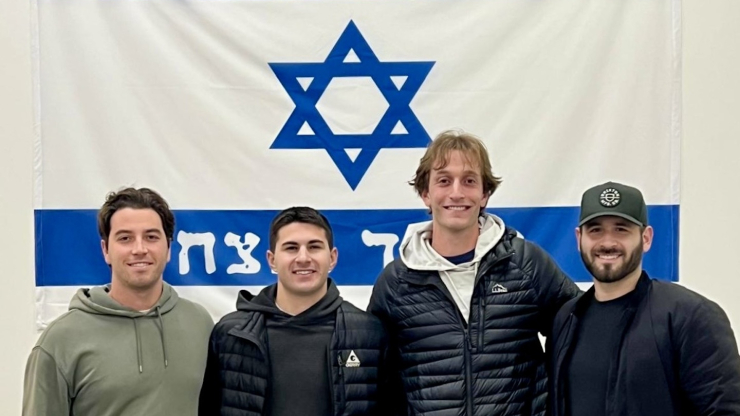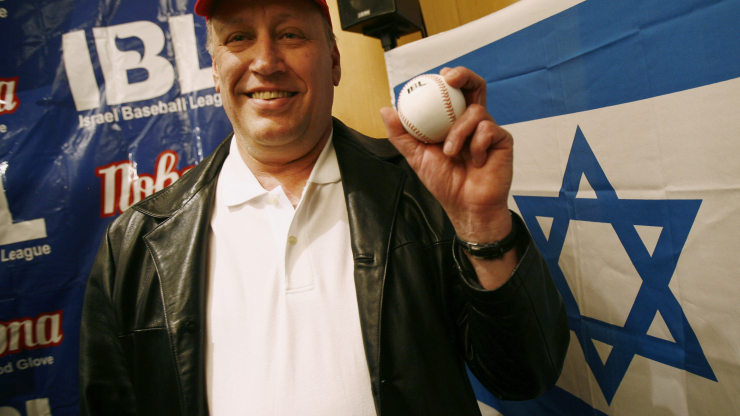
FASTBALLS AND FRIENDSHIPS
How Israel Baseball Learned the Dominican Way
by Chase Levitt
When Nadav Machlin stepped up to the plate, he felt incredibly far away from home.
Over six thousand miles from the promised land in the Dominican Republic’s province of Samaná, the Israeli infielder had had no time to warm up. His friend Adriel Radney, a top prospect in the Arizona Diamondbacks organization, didn’t ask Machlin to play until just before the first pitch of this exhibition.
Borrowing another player’s bat and batting gloves—he didn’t bring any equipment, never expecting to be playing—Machlin came to the plate for the first time in the fifth inning. The 20-year-old watched an off-speed pitch bend low and outside for a ball.
The young Israeli was facing an A-ball pitcher whose fastball touched the low nineties, a big change from the low eighties Machlin had been facing back home.
To make matters worse, the big-armed righty was dealing, having taken a no-hitter into the fifth inning.
But Machlin got a fastball inside, took a swing and smacked a line drive base hit to left field. The 300 or so fans in attendance immediately cheered and whistled for this mystery foreigner. After the game, many of them lined up along the fence, hollering to get Machlin’s attention and congratulate him.
“The crowd went crazy,” Machlin said. “They were cheering for me, and I was hyped to the sky.”
Not a bad way to end a vacation.

As part of its developmental efforts, Israel Baseball plans international training trips for its national team players. This offseason, many players had the opportunity to compete in the Japan Winter League, while Machlin and catcher Tomer Erel were hand-selected for a two-month training opportunity in the Dominican Republic that started in early November 2024.
They spent their first month training at the Los Angeles Dodgers’ academy in Campo Las Palmas. Sleeping in the facility’s dormitories, Machlin and Erel were full participants in training drills, simulated games, batting practice, fielding practice, meals and strength training with the Dodgers’ signed prospects, giving them the rare opportunity to live and train like professionals.
“In Israel, it’s tough to be an athlete,” said Israel Baseball Director Assaf Lowengart, referring to, among other things, the difficulty that athletes like Machlin and Erel face when combining sport training with service in the Israel Defense Forces. “They got to see another side of what it means to be an athlete and how you should be treated, and what it means to be an athlete, on the athlete side, of how they train every day.”
After a month wearing Dodger blue, the two twenty-year-olds split up and continued their training elsewhere in the Dominican.
Machlin spent several weeks at the JD Ozuna Baseball Academy in La Vigía, a facility designed for Dominican prospects who have yet to sign with an MLB organization. Working largely on hitting drills, the sabra made great improvements in his swing, and was even able to show off his improved skills to visiting Atlanta Braves designated hitter Marcell Ozuna when the two took batting practice together.
For the last week of the trip, Machlin traveled to Samaná to visit Radney. Expecting time away from competition, he didn’t bring any of his equipment, which eventually led to him needing to borrow the basics for his mid-game heroics.
Meanwhile, Erel spent several weeks training with Fernando Tatís, the 11-year big-league veteran and father of current San Diego Padres outfielder Fernando Tatís Jr. Not only did the senior Tatis provide private instruction, he also invited the catcher to stay at his personal residence and train at his private academy in San Pedro de Macorís.
During his time with Tatis, Erel hit his first-ever home run. He perfectly remembers this milestone, not only for his accomplishment, but also for his Dominican peers’ reaction.
“They got so excited that I was there because they’ve been training with the same people for like the last five years. And of course, especially when I don’t know Spanish, and I walked over there… I hit a home run, and they all jump,” Erel explained. “They’re all like, ‘who is this [new] guy?’”

Tatís also invited Erel to take part in pregame workouts for the Estrellas Orientales, the Dominican Republic Professional Baseball League (LIDOM) team Tatis manages.
LIDOM is the highest level of professional baseball in the Dominican Republic. All competition takes place during the MLB offseason, with regular-season contests from mid-October to late December, and playoffs that go through January. Founded in 1951, LIDOM routinely draws both established major-league veterans and top prospects. This season, MLB vets Robinson Canó, Miguel Sanó, Raimel Tapia, and Abraham Almonte played for the Estrellas, along with New York Yankees No. 4 prospect Roderick Arias and Diamondbacks No. 29 prospect Christian Cerda (rankings per MLB Pipeline).
Erel caught many bullpens for the team and often took batting practice with them. He found himself particularly friendly with Canó, who regularly took the time to personally assess the amateur’s swing.
“I would have Fernando Tatís and Robinson Canó in the cage with me, working on my swing,” said Erel, marveling at the memory. “I got a lot better with my swing.”
Machlin and Erel’s Caribbean experience this winter was the latest development in a strong relationship between Israel Baseball and the Dominican Republic.
It began in 2021, when Ernesto Torres-Pereyra, then the Dominican’s newly-appointed Ambassador to Israel, reached out to Israel Baseball President Jordy Alter. Tasked with advancing relations between the two countries, Torres-Pereyra thought that baseball, his nation’s great passion, would be an ideal opening into developing a relationship. The pair met in person that June, discussing ways the Dominican Republic could assist Israel Baseball in both its athletes’ development as well as enhancing the sport’s status within the country.
“I think at the end of the day, they just want to help,” Alter said. “I think it’s just something that they feel in their heart that they just want to do.”
Shortly after the meeting, that spirit of help and co-operation was set aside as Israel and the Dominican Republic matched up on the diamond in Tokyo. Playing in the delayed 2020 Summer Olympics, Israel was down 5-4 heading into the eighth inning of an intense back-and-forth elimination contest. Danny Valencia, Israel’s first baseman and best hitter, blasted a two-run home run in the top of the frame to give Israel the lead and put the D.R. six outs away from a trip home.
But Johan Mieses hit a solo shot in the bottom of the ninth to tie the game and a few batters later, 15-year major-league veteran José Bautista scorched a ground ball into left field for a game-winning single, ending Israel’s incredible Olympic run.
The blue and white left their mark, as the heavily-favoured victors were incredibly impressed. Breaking COVID-19 protocols, the Dominican players spontaneously lined up to embrace and congratulate Team Israel on its outstanding performance just moments after the game’s conclusion.
“We weren’t allowed to meet any other athletes. We weren’t allowed to shake hands or do anything,” said Alter of the pandemic restrictions during the Olympics. “And at the end of the game, the Dominican players came over to us, and they all shook our hands, out of the respect that we were able to compete on the same field with them.
“That love, it was a beautiful, beautiful moment.”

Several months later, the Dominicans would continue showing their love for Team Israel. Alter and Torres-Pereyra’s conversations spawned a January 2022 trip to the island for six players and one coach arranged by Israel Baseball and DR National Baseball Commissioner Junior Noboa. They practiced at the country’s top facilities and trained at Major League Baseball’s academy in Puerto Plata, attended the LIDOM championship and visited local Jewish communities.
After the MLB season, Israel Baseball welcomed Dominican MLB stars Nelson Cruz and Jeimer Candelario, as well as Venezuelan MLB infielder César Hernández, for a tour of the country while the trio served as volunteers for the Philos Project, an international nonprofit organization that strives to both enhance Christian support of Israel and combat antisemitism. As part of the tour, the three athletes visited both Jewish and Christian religious sites throughout the nation and hosted a baseball clinic for 350 young Israelis at the Ezra Schwartz Ballpark in Ra’anana.
“To meet the people in Israel, to get to know them… has been incredible,” said Cruz, who also found himself inspired spiritually by the tour’s visits to sacred Christian places. “To talk about baseball, to talk about life, family; it becomes so easy to fall in love with [Israel].”
This marked just the beginning of the collaboration between Israel Baseball and the Philos Project. A few months later, the two organizations would again unite to host an antisemitism awareness event in Miami just hours prior to Israel and the Dominican meeting in that year’s World Baseball Classic.
Featuring players, coaches, and diplomats from both countries, the gathering brought together local youth to connect with the professional athletes and discuss ways to combat racism. They also took part in a ceremony in honor of the White Rose Holocaust Resistance Movement that fought against Nazi antisemitism in the early 1940s.

The Philos Project returned to Israel in November 2024. This time, it brought a collection of Christian professionals along with Cruz, both to show solidarity with Israel in the wake of the October 7th massacre and to get a first-hand look at the damage done.
“It was really shocking and touching,” Cruz said. “And we’ve definitely come up stronger in the mentality that we need to do whatever it takes to help the country.”
The Israel-Dominican Republic baseball relationship has a bright future, with the countries having made more plans to work together, including a fundraiser in Sosúa, D.R. involving the Philos Project.
In the 1930s and ‘40s, the Dominican openly accepted Jewish immigrants who were fleeing European persecution. Sosúa was one of the towns that settled Jews, some of whom founded a sausage company that became renowned within the country for its production of the beloved Dominican staple. Now, despite several ownership transfers, that company, Productos Sosua, still exists as a leading sausage manufacturer.
Hosting a collection of Jewish, Israeli, and Dominican MLB players, the Sosúa event will feature a celebrity softball game open to the public followed by a dinner to raise funds for the Philos Project and Israel Baseball. Cruz, who was born nearby in Puerto Plata, intends to take a leading role.
Additionally, Israel Baseball and the Dominican Republic are planning for a group of Dominican coaches and umpires to visit Israel. This had been planned for late 2023 – with major-league players involved as well – but the then-accelerating Gaza War forced it to be postponed.
While Israel has some coaches and umpires, very few of them have experience abroad, so the Dominican pros’ instruction will be a huge help in advancing the overall levels of Israeli coaching and umpiring.
“A player will get much better with a good coach that can fix his mechanics, that can look at him and say ‘you need to fix this now, and you need to fix that,’” Machlin said. “Some [Israeli] coaches don’t really know swing mechanics or throwing mechanics. I think our room to grow and our potential is much bigger because we have more room to fix our mechanics and get much better.”
And while the Dominican visitors are planning to share their knowledge of these important skills to Israel Baseball as a gift, their generosity would hand Alter a unique dilemma.
Alter has hosted traditional Shabbat dinners for the Dominicans each time they have visited Israel. At the first dinner, the Israel Baseball President tried to make a traditional Dominican stew so that the athletes would feel at home.
While the night itself was a success– the guests were fascinated by the religious rituals and actively contributed to the ensuing theological discussion – Alter could tell that he was unsuccessful in his attempt at culinary reconstruction.
The second time, when Cruz and the Christian professionals arrived, Alter decided to reverse course and make a traditional Jewish dish. He prepared a cholent. It was a huge hit.
“They just couldn’t get enough of it,” Alter said.
When he hosts his Dominican visitors a third time, maybe Alter can try to combine traditions. The challenge is to provide a traditional Jewish culinary experience, but also make his guests—unlike Machlin during his unexpected plate appearance—feel right at home.
Maybe a Sosúa Salami would do it. Kosher, of course.
Related News & Updates
View All
“That the children playing today in Ra’anana will represent Israel in Los Angeles 2028”
Chairman of the Israel Association of Baseball, Ari Varon, believes in the future of the sport, “that…

BASEBALLIYAH: CLASS OF ’25
By Becca Weinberg There was a noticeable shift in the dusty grass lining Israel’s first baseball…

Ken Holtzman, First Yahrzeit: From MLB to IBL
By Bill Simons, Co-director, The Cooperstown Symposium on Baseball and American Culture Ken Holtzman…